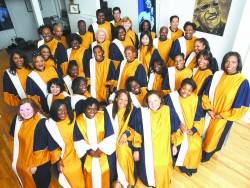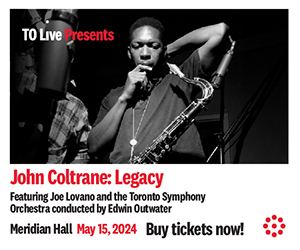 In my last column I promised to address the reluctance of audiences to attend performances of new music, even to the point of vetting concerts over the phone to make sure nothing on the program is too modern.
In my last column I promised to address the reluctance of audiences to attend performances of new music, even to the point of vetting concerts over the phone to make sure nothing on the program is too modern.
One reader wrote in to observe that time often sifts through and discards the inferior music of past eras, leaving a core of proven masterworks that form the basis of performers’ standard repertoire; with a finite amount of time and resources for concert-going, it is reasonable to concentrate on works that have some guarantee of quality and durability.
I wrote back and pointed out that time was actually an unreliable source and judge of quality. Many composers whose work was neglected to various degrees after their deaths were revived by later musicians, found an audience, and now are considered important. Into this category fall Bach, Mahler, Vivaldi, Monteverdi, as well as composers popular with early music audiences such as Dowland, Gesualdo and Biber.
Hearing well-known works repeatedly can be both pleasurable and a way to a deeper understanding of these compositions. But there is great fun, satisfaction and real excitement in feeling that you are singing (or listening to) something new and unusual.
The reader and I agreed in a pleasant email exchange that an active, engaged audience was needed, to be receptive to musicians who champion both new and neglected works. Only with these kind of listeners can time and successive audiences find which composers speak to them most deeply.
For those interested in being part of a vanguard of new, varied and interesting choral projects, there are fascinating opportunities this July and August at Stratford Summer Music.
The festival, somewhat overshadowed in the past by the town’s renowned Shakespeare festival season, has in recent years emerged as a hub of innovative summer programming. This year, their focus is on choral music.
This year Stratford Summer Music is inviting interested choral singers of all ages, abilities and experience to participate in a series of events titled “We Sing the World – a Choral Symposium,” over the course of four days, July 18 to 21. The musicians leading rehearsals, panel discussions, concerts, workshops and lectures are a mixture of Canadian and international choral music experts. The festival’s two themes are the environment and world culture; the workshops and discussions will address how world culture and environmental concerns are influencing and shaping choral music in the new century.
Participants will form a chorus that will rehearse during the symposium and perform a concert at the end of the weekend. Registration information can be found at stratfordsummermusic.ca.
The festival’s programming is stylistically diverse, situating classical choral singing within the larger context of world music and modern vocal techniques. Concerts will include appearances by the famous Vienna Boys’ Choir (July 26 to 28); Johannesburg’s Mzansi Youth Choir (August 22 to 24); Anúna, the Irish national choir (as part of the choral symposium); and an August 4 concert by the Toronto Mass Choir, one of the city’s best gospel music ensembles.
The festival is also devoting a substantial part of the summer to an exploration of the work of legendary Canadian composer R. Murray Schafer, perhaps the most internationally renowned Canadian composer alive. On July 18, the opening day of the choral symposium, Schafer celebrates his 80th birthday.
Schafer has been an iconoclast from the beginning, rebelling against the stultifying conventions of the classical concert paradigm from the 1960s onward, setting his music dramas in lakes and woodland locales. Schafer’s innovations seem prescient now, as young classical musicians are venturing away from the concert hall with increasing frequency and looking to bars, clubs and other non-traditional spaces to try to connect with audiences. (His Music for Wilderness Lake will be performed along the Avon River at 7am from July 19 to 21).
At the same time, there are strongly traditional elements in Schafer’s work that connect him to European Romantic strains in myth, opera and literature. His work often depicts metaphysical struggles between good and evil, light and dark. Sexuality, particularly female sexuality, is sometimes presented as a destabilizing, threatening force.
Activities focusing on Schafer’s work include an 80th birthday dinner July 18, an exhibition of hand-drawn scores opening July 17 (Schafer’s scores are notable for their unusual artistry and draftsmanship, incorporating visual imagery as well as traditional music notation), lectures, symposia and concerts.
Other concerts and festivals of note:
At the Elora Festival, there are many opportunities to see the Elora Festival Chorus, which is appearing in at least eight separate shows. Notable concerts with an anniversary theme are “Coronation: Crowning Glory” on July 20, which is a celebration of Queen Elizabeth’s 1953 coronation, and a centenary celebration of the birth of Benjamin Britten on July 28.
The Tafelmusik choir and orchestra take part in a very intriguing blend of dance and music on June 21 and 22, as part of the Luminato Festival. The ensembles accompany choreographer Mark Morris’ interpretation of Handel’s L’Allegro, il Penseroso ed il Moderato.
Handel’s setting combines John Milton’s two poems, L’Allegro and Il Penseroso, in a metaphysical dialogue. L’Allegro (roughly, the lively one) is happy, active — something of a party animal, actually — and Il Penseroso (the introspective one) is pensive, ruminative, even a bit gloomy. The two poems are companion pieces that explore opposite approaches to life, spirituality and sensation.
Handel and his librettist interspersed the two poems, creating a dramatic tension between the classic Eros and Thanatos principles. Recognizing that whichever text came last would get the final word on the argument, they added new text and a third character, il Moderato, that attempts to mediate and find a middle path between the two extremes.
Whether this succeeds as a dialectical synthesis is a matter of opinion. The new text comes down rather on the side of il Penseroso, and l’Allegro — whose approach strikes me as more fun — is treated as a bit of an unruly teenager in need of curbing. But this was very much in harmony with the aesthetic of the time, which was ultimately about balance, grace and proportion in all things. Handel’s music mines the text and finds many opportunities for word painting and expressiveness. The show also incorporates the images of poet/draftsman/painter William Blake and has been a hit since its premiere in 1988.
The Kokoro Singers, based in the southern Ontario region, perform “Earth, Air, Fire, Water” on June 9 in Guelph and on June 15 in Dundas. The concerts feature works by Hatfield, Whitacre, Ticheli and Thompson.
On June 15 the Cabbagetown Classical Youth Choir performs its annual spring concert, which features excerpts from Mozart operas and other works. The choir’s mandate is to give singing opportunities to children of families in difficult economic circumstances, and they are soliciting funding to help with this worthy goal. The concert is the finale of an operatic workshop for youth, and features a special appearance by legendary Canadian bass-baritone Gary Relyea.
From England, the Bradfield College Tour Choir is visiting Canada. This youth choir has performed all over Europe, and in the US as well. Their musical director, Anne Wright, is originally from Toronto. They are singing in Niagara Falls on July 4, and in Toronto on July 3 and 6. The July 3 concert takes place at Casa Loma.
Hamilton’s Arcady Singers sing several concerts as part of the Brott Music Festival, which takes place in venues in Burlington, Hamilton and Ancaster. On June 20 they will be featured in a performance of Beethoven’s Ninth Symphony; on August 1 they take part in a concert performance of Verdi’s Aida; and on August 15 the festival’s grand finale is Mahler’s Symphony of A Thousand, which is really an oratorio for choir and soloists.
On July 28 the Hart House Singers perform “The REAL Glee: Songs made famous by Yale, Harvard and Hart House Glee Clubs.” Glees — part songs for small ensembles — have been around for centuries. The modern high school glee club is a mixture of standard choir and show choir, a kind of choreographed choir/music theatre hybrid. But up to the middle of the 20th century, glee club music was a collegiate phenomenon with a particular aesthetic and style. It combined folk songs, school songs, 19th century parlour music and archaic sounding Latin lyrics in a manner that has almost disappeared. This concert — which will also feature modern songs that might be more familiar to the Glee television audience — is a chance to revisit and enjoy this charming repertoire.
The Elmer Iseler Singers appear in Parry Sound at the Festival of the Sound on July 18, in a mixed concert of popular Canadian music that includes Srul Irving Glick’s The Hour Has Come. This tuneful and accessible piece, premiered by the Toronto Mendelssohn Choir in 1985, has become something of a Canadian choral standard. The Toronto Mendelssohn Choir also appears at the festival on August 11, singing Orff’s Carmina Burana.
Speaking of unconventional locations, the Westben Festival (various dates between June 8 and August 4) takes place in Campbellford, which is in the mid-Ontario region of Northumberland County. All the concerts take place at the Westben Barn. Westben Youth and Teen Choruses will be taking part in a version of Bizet’s Carmen July 4 to 7, a concert of selections from Broadway musicals June 9 and a performance of Beethoven’s Choral Fantasy June 29.
That’s all, folks. Enjoy the music and have a great summer!
Ben Stein is a Toronto tenor and theorbist. He can be contacted at choralscene@thewholenote.com. Visit his website at benjaminstein.ca.



